| Product Name |
Moringa Oil - Organic Oil of Moringa Oliefera |
| Product Description |
Pale yellow in colour and odourless, with a mild characteristic nutty flavour. |
| Principal Constituents |
Oleic (67% to 72%), Palmitic and Stearic |
| Extraction |
Cold pressing of the dried moringa seed. |
| Organic Status |
Moringa seed from our own organic farm certified by Lacon Quality Certication Ltd.
|
| Packing and Transportation |
Moringa oil has a potent antioxidant considered to be the factor behind its remarkable stability. It also has nourishing and emollient properties for use in skin and hair care products. |
Neem Oil - Characteristics
Neem oil is generally light to dark brown, bitter and has a rather strong odour that is said to combine the odours of peanut and garlic. It comprises mainly triglycerides and large amounts of triterpenoid compounds, which are responsible for the bitter taste. It is hydrophobic in nature and in order to emulsify it in water for application purposes, it must be formulated with appropriate surfactants.
Neem oil also contains steroids (campesterol, beta-sitosterol, stigmasterol) and a plethora of triterpenoids of which Azadirachtin is the most well known and studied. The Azadirachtin content of Neem Oil varies from 300ppm to over 2500ppm depending on the extraction technology and quality of the neem seeds crushed.
| Average composition of Neem Oil fatty acids |
| Common Name |
Acid Name
|
Composition range |
| Omega-6 |
Linoleic acid |
6-16% |
| Omega-9 |
Oleic acid |
25-54% |
| Palmitic acid |
Hexadecanoic acid |
16-33% |
| Stearic acid |
Octadecanoic acid |
9-24% |
| Omega-3 |
Alpha-linolenic acid |
- |
| Palmitoleic acid |
9-Hexadecenoic acid
|
- |
Uses
Neem oil is not only used for cooking purposes but, in India and Bangladesh, it is used for preparing cosmetics (soap, hair products, body hygiene creams, hand creams).
Neem Cake
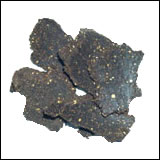 Neem cake organic manure is the by-product obtained in the process of cold pressing of Neem fruits and kernels, and the cold pressed extraction process for neem oil cake, neem seed cake as manure & nitrification inhibitor and after processing neem cake can be used for partial replacement of poultry and cattle feed. Neem cake organic manure is the by-product obtained in the process of cold pressing of Neem fruits and kernels, and the cold pressed extraction process for neem oil cake, neem seed cake as manure & nitrification inhibitor and after processing neem cake can be used for partial replacement of poultry and cattle feed.
Components
Neem Cake have adequate quantity of NPK in organic form for plant growth. Being totally botanical product, it contains 100% natural NPK content and other essential micro nutrients as N (Nitrogen 2.0% to 5.0%), P (Phosphorus 0.5% to 1.0%), K (Potassium 1.0% to 2.0%), C a(Calcium 0.5% to 3.0%), Mg (Magnesium 0.3% to 1.0%), S (Sulphur 0.2% to 3.0%), Zn (Zinc 15 ppm to 60 ppm), Cu (Copper 4 ppm to 20 ppm), Fe (Iron 500 ppm to 1200 ppm), Mn (Manganese 20 ppm to 60 ppm). It is rich in both sulphur compounds and bitter limonoids.
Uses
Neem cake organic manure protects plant roots from nematodes, soil grubs and white ants probably due to its content of the residual limonoids. It also acts as a natural fertilizer with pesticidal properties.
Neem seed cake also reduce alkalinity in soil, as it produces organic acids on decomposition. Being totally natural, it is compatible with soil microbes, improves and rhizosphere microflora and hence ensures fertility of the soil. Neem Cake improves the organic matter content of the soil, helping improvement in soil texture, water holding capacity, soil aeration for better root development.
Neem cake is effective in the management of insects and pests. The bitter principles of the soil and cake have been reported to have seven types of activities (a) antifeedant (b) attractant (c) repellent (d) insecticide (e) nematicide (f) growth disruptor and (g) antimicrobial.
Pungai seed oil (Pongamia Pinnata)
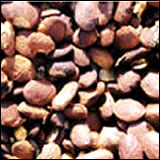 Pongamia pinnata is one of the few nitrogen fixing trees (NFTS) to produce seeds containing oil. It is often planted as an ornamental and shade tree but now-a-days it is considered as an alternative source for Bio- Diesel. This species is commonly called pongam, karanja, or a derivation of these names. This oil is rapidly gaining popularity as an important source of fuel for diesel engines. Pongamia pinnata is one of the few nitrogen fixing trees (NFTS) to produce seeds containing oil. It is often planted as an ornamental and shade tree but now-a-days it is considered as an alternative source for Bio- Diesel. This species is commonly called pongam, karanja, or a derivation of these names. This oil is rapidly gaining popularity as an important source of fuel for diesel engines.
The flowers are used by gardeners as compost for plants requiring rich nutrients and are used in many traditional remedies. Juices from the plant, as well as the oil, are antiseptic and resistant to pests. In addition the Pongam tree has the rare property of producing seeds of 25-35% lipid content. The seed oil is an important asset of this tree having been used as lamp oil, in soap making, and as a lubricant for thousands of years.
Botany: Pongam (Leguminoceae, subfamily Papilionoideae) is a medium sized tree that generally attains a height of about 8 m and a trunk diameter of more than 50 cm. The trunk is generally short with thick branches spreading into a dense hemispherical crown of dark green leaves. The bark is thin gray to grayish- brown, and yellow on the inside. The taproot is thick and long. Lateral roots are numerous and well developed.
Pungai seed cake
Pungaiseed cake is the by-product obtained in the process of cold pressing of Pungai seed kernels, and the cold pressed extraction process for pungai seed oil cake. Pungam seed cake as manure .and after processing pungam seed cake can be used for partial replacement of poultry and cattle feed.
Punnai seed oil
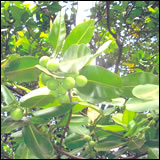 It is a low-branching and slow-growing tree with a broad and irregular crown. It usually reaches 8 to 20 m in height. The flower is 25 mm wide and occurs in racemose or paniculate inflorescences consisting of 4 to 15 flowers. Flowering can occur year-round, but usually two distinct flowering periods are observed, in late spring and in late autumn. The fruit (the ballnut) is a round, green drupe reaching 2 to 4 cm in diameter and having a single large seed. When ripe, the fruit is wrinkled and its color varies from yellow to brownish-red. It is a low-branching and slow-growing tree with a broad and irregular crown. It usually reaches 8 to 20 m in height. The flower is 25 mm wide and occurs in racemose or paniculate inflorescences consisting of 4 to 15 flowers. Flowering can occur year-round, but usually two distinct flowering periods are observed, in late spring and in late autumn. The fruit (the ballnut) is a round, green drupe reaching 2 to 4 cm in diameter and having a single large seed. When ripe, the fruit is wrinkled and its color varies from yellow to brownish-red.
Uses
The seeds yield a thick, dark green oil for medicinal use or hair grease. Active ingredients in the oil are believed to regenerate tissue, so is sought after by cosmetic manufacturers as an ingredient in skin cremes. The nuts should be well dried before cracking, after which the oil-laden kernel should be further dried.
This oil act as ANTIMICROBIAL, ANTIOXIDANT, HAIR CONDITIONING, ORAL CARE, SKIN CONDITIONING field.
Punai Seed Cake
Punai seed cake is the by-product obtained in the process of cold pressing of Punai seed kernels, and the cold pressed extraction process for punai seed oil cake. Punai seed cake as manure and after processing punai seed cake can be used for partial usage in medicinal field.
Watermelon Seed Oil
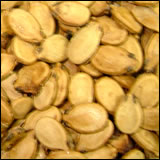 Watermelon seed oil is also known as ootanga oil and kalahari oil. In Africa, Watermelon seeds have been prized for the highly nutritive oil that they contain. Traditionally, the seeds are removed from the rind and then allowed to dry outside in the sun. Once dried, the seeds are then pressed to extract the beneficial oil. Watermelon seed oil is also known as ootanga oil and kalahari oil. In Africa, Watermelon seeds have been prized for the highly nutritive oil that they contain. Traditionally, the seeds are removed from the rind and then allowed to dry outside in the sun. Once dried, the seeds are then pressed to extract the beneficial oil.
The light texture, moisturizing capabilities and stable shelf life of watermelon seed oil lends it to be a highly suitable addition to natural baby oil formulations. Unlike mineral oil that is a common ingredient in commercial baby oils, watermelon seed oil does not clog pores or prevent the body from naturally eliminating toxins through the skin. The rich composition of essential fatty acids contained in watermelon seed oil helps to restore elasticity to the skin. It, therefore, is also a wonderful addition to skin care formulations for all skin types, including dry, oily, acne-prone or maturing skin. Watermelon seed oil is also a perfect choice for inclusion in hair care formulations as it is non-greasy yet highly moisturizing.
Watermelon Seed Oil Properties:
- Light in Texture
- Non-Greasy
- Penetrating
- Absorbs Quickly
- Highly Moisturizing
- Emollient
- Rich in Omega 6 and 9 EFAs
- Dissolves Sebum Buildup
- Stable Shelf-Life
Watermelon Seed Cake
Watermelon seed cake is the by-product obtained in the process of cold pressing of Watermeloni seed kernels, and the cold pressed extraction process for watermelon seed cake. Punai seed cake as manure and after processing punai seed cake can be used for partial usage in cosmetics feild.
Apple Seed Oil (Pyrus malus)
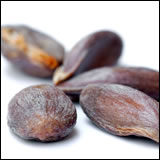 This is a fixed oil obtained by cold press from the kernel of the apple seed. It is used in the cosmetic industries to produce shampoos and soaps for black hair. It gives shine and strength to the hair. It is used also as a base for some aromatherapy compounds. This is a fixed oil obtained by cold press from the kernel of the apple seed. It is used in the cosmetic industries to produce shampoos and soaps for black hair. It gives shine and strength to the hair. It is used also as a base for some aromatherapy compounds.
This oil has a slight almond-like odor and a very mild, pleasant taste. In tropical countries, the oil is used as normal cooking oil or a salad oil. It is also called Sapuyul Oil.
|
